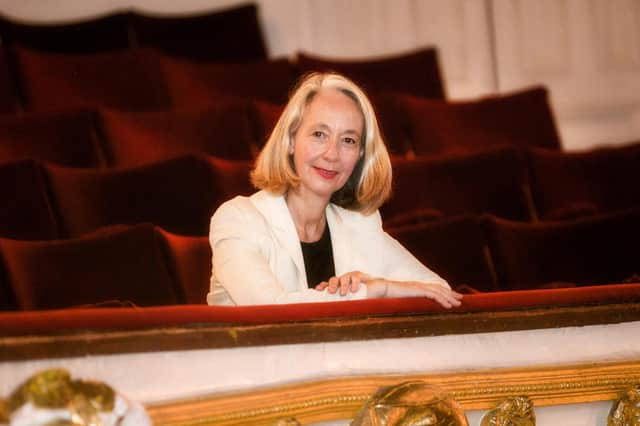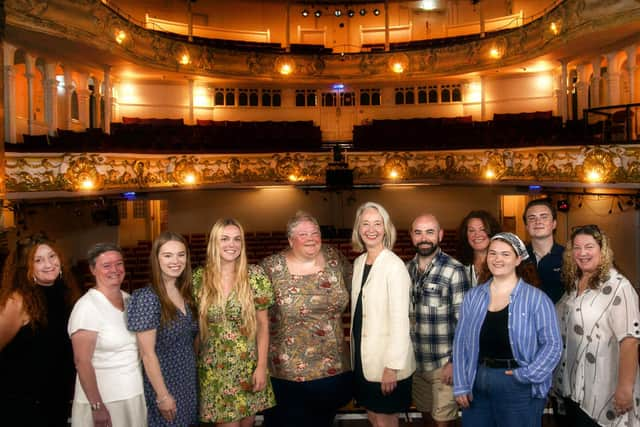Meet Portsmouth venue New Theatre Royal's new CEO, Dr Anna Farthing


The Guildhall Walk theatre has been without a CEO since Scott Ramsay departed in early 2020.
For much of her career, Anna has worked in port cities – as her impressive resume shows.
Advertisement
Hide AdAdvertisement
Hide AdShe joins NTR from Arts University Bournemouth where she led on research and innovation and managed its theatre, library, gallery, archives and collections, a designated museum and public programmes.


She has also worked on projects for Bristol’s Museum of the Year-winning M Shed; the Tobacco Factory Theatre in Bristol; the International Agatha Christie Festival in Torquay, the Weston Arts and Health Festival, Weston-Super-Mare, and the International Slavery Museum in Liverpool.
She also curated a major Philip Larkin exhibition for Hull’s European City of Culture programme and Chatsworth Renewed, for one of the UK’s most visited stately homes.
On top of that Anna is an author, serves on the boards of National Museums Liverpool and St George’s Music Trust and achieved a PhD from the University of Manchester in 2011.
Advertisement
Hide AdAdvertisement
Hide AdAnna officially starts working at the city centre on Monday, but has already moved into Southsea, as she was keen to experience Victorious Festival last weekend.
Growing up in Otterbourne, near Winchester, she recalls: “My dad was a very keen sailor so I spent a lot of my childhood sailing around the Isle of Wight, as you do when you live near the Solent, and running aground on The Brambles! So I know the area a bit, but I've been away a long time. It's just fantastic to be back to be honest.”
Elaborating on her affinity for coastal locations, she explains: "My father is from Clacton-on-Sea, my mother is from Southend-on-Sea and I grew up on the south coast. I then moved to Bristol and was based in Bristol for a long time. And then I've worked in port cities like Hull and, Liverpool. And then immediately before here I was in Bournemouth, but I've also done quite a lot of work in Torquay and Western-super Mare – so yes, I have to be near tidal water!”
She has also worked with the National Museum of the Royal Navy, in the Historic Dockyards, including the HMS Hear My Story project which gathered oral histories from serving personnel and veterans and their families.
Advertisement
Hide AdAdvertisement
Hide Ad"I also did a project where we got kids to interview veterans with direct experiences of conflict, including the Second World War, so we interviewed the last surviving group of people from the Normandy landings, and the Arctic convoys, then also more recently, people who'd had experience in the two Gulf Wars.
“That was really interesting because when children ask naval veterans about their experiences – children will ask questions that adults perhaps wouldn't. When the veterans answer in a way that's suitable for a 10-year-old, it's probably suitable for a museum audience.”
Despite all her experience, this roles offers a new challenge to Anna.
“I've never run a building before. I've run festivals, productions, projects, and I had a production company for a long time. But I haven't actually run a building.
Advertisement
Hide AdAdvertisement
Hide Ad“I've always been fascinated by Victorian theatre history. I've always been interested in the kind of middle of the 19th century and this place was built in the 1850s. And really, so much of what we know and we think about what Britain is, is from that era. That's when all the big public buildings were created, the town halls, the museums, the libraries, the terraces of housing, drains, trains railway stations, but culturally, that idea that the kind of industrialisation means that you've got these people living in towns and cities, and they need places to go, and to come together and to celebrate or commiserate or tell their stories or whatever.
So you've got that massive period of building theatres, and assembly halls and concert halls and town halls and museums as well. This is such a fantastic example of that. And it is an it is a unique, for people who are kind of geeky, like me about architecture, it is unique in that it is both a Phipps and a Matchams (both renowned theatre architects) theatre.
“These buildings were built for people. They were built to welcome all kinds of people and to share all kinds of stories in all kinds of ways, so you had music hall, opera, theatre, serious drama, comedy. If you look at the playbills from the 1850s, which we've got quite a lot of in our an archive, you do get a bit of everything. On one playbill you might have a Shakespeare, a comedy song, a new invention – maybe moving pictures. It's a real kind of richness. I suppose what I love about this theatre is that I love the building, I love the history of it, but I also love the eclectic programming.
"We're not doing all of that on one night! But we are offering that really broad range of programming for all kinds of different types of audiences. Whether that's (2023’s pantomime) Aladdin, or the music of Hans Zimmer being played by an orchestra under the moon or Crimes on Centre Court which is a comedy drama, or Ukrainian choir, or Filskit, which does the gigs for under-fives, which is that first opportunity for preschool children to experience theatre and be transported.
Advertisement
Hide AdAdvertisement
Hide AdThen we're increasingly hosting real world-leading theatre companies like Les Enfants Terribles doing The House With Chicken, which is an international, quality piece of work. But also, if you want to come and hear Francis Rossi talking about being in Status Quo and doing a few tunes.... We've got a bit of everything. I love it, so we're going to carry on programming in that way – eclectically. But we'll use more of the building. We'll use the auditorium, but we'll increasingly use the studio, and now that the street outside has been pedestrianised, we can spill out onto the street more and be part of that kind of evening economy.”
While Anna clearly has big ideas already for the venue, she is also aware that it needs to make money if it is to remain open – off-the-wall art that doesn’t put bums on seats isn’t going to cut it.
"I think people forget that all charitable business, whether you're a charity or an arts organisation or a charitable arts organisation as we are, we're still in business. You still have to balance the income and expenditure.”
And she is keen to find the theatre’s place in the local cultural ecosystem.
Advertisement
Hide AdAdvertisement
Hide Ad"We're not like the Guildhall and we're not like The Kings. But if you look at the way that they're resourced it's a completely different ballgame. We need to find our niche, we need to find our USP. I think that our our benchmarks are similar theatres in other port cities – so similar theatres in Liverpool or in Newcastle, or, places like that. We are more similar to them in terms of being right in the town centre in an area that has a variety of challenges, let's face it.
"We need to be bold and colourful and magical and tell big stories with a big heart and have a big welcome. This isn't the place to be twee or coy.”
She has already started filling her diary with meetings with figures from numerous aspects of that local scene – including the NTR’s affiliated artists Downtown Pompey and Filskit Theatre.“We've got a new chair (Angela Parks), a new CEO and a new board, but we also have fantastic staff who have been here longer – it's a really good combination of tried and trusted experience and new ideas and new eyes.”
The theatre’s physical location, right in the city centre is also crucial.
Advertisement
Hide AdAdvertisement
Hide Ad"We're on Guildhall walk – we are absolutely at the heart of the clubbing nighttime economy, and we need to engage with it in a positive and creative way to to help that nighttime economy be great fun, but also safe, welcoming, enjoyable – all of that.
“If you've grown up around British seaside resorts or port cities, this isn't a highfalutin version of theatre. This is about understanding that people are wanting to have a good time. And that includes all of the emotions – they want to laugh, they want to cry, they want the good old ding-dong, have an argument, they want to kiss and make up. They want to have all of the sensations and all of the experiences.
“We can we give people that full range of experiences in ways that are safe and healthy.”For Anna it comes down to what the theatre can offer that nowhere else can – a unique experience.
“Live experience is back. The reason why people want to go to places like Victorious and Glastonbury, Latitude and all the rest of it, and I think the reason why something like The Play That Goes Wrong is so popular, is because people want an unrepeatable live experience.
Advertisement
Hide AdAdvertisement
Hide Ad"Everything that is digital can be endlessly repeated, endlessly manipulated, you can watch the same TikTok video 1,000 times and it can be seen by a million people, but if you have a live experience with a friend or even on your own, you're making memories which are entirely unique. I think people are really beginning to realise that again.”
Anna’s love for the performing arts was instilled in her by two key figures.
"I'd always been interested in the chorus girls and the backstage stories of these working class people. My nan, Gladys Lane, she used to say don't you forget, I was born within the sound of Bow Bells and we're related to Lupino Lane – a music-hall artist, and Ida Lupino who became a filmstar. I'm sure this isn't true, but she used to think she was and this gave her a way in!”
And also an inspiring teacher at Southampton Tech where she did an A-level in theatre studies – Roy Faithfull. He pushed her to apply to university, and she became the first in her family to do so.
Advertisement
Hide AdAdvertisement
Hide Ad“I ended up at Bristol University. And there were only two of us who'd been to state schools on the course. I just put my hand up for everything because for me, it was this extraordinary opportunity.”
By the end of week three, she was putting on her first show.
From talking to Anna, it’s clear her roots have informed her taste in theatre – and her plans for the NTR.
“I suppose because I'd grown up doing a lot of ballet and stuff like that and seeing shows that what was then the Gaumont and became the Mayflower, I had an appetite for theatre that was magical and sparkly and transported you – perhaps I was thinking about Swan Lake, or Sleeping Beauty or a big musical like Seven Brides for Seven Brothers, or Carousel.
Advertisement
Hide AdAdvertisement
Hide Ad“My taste in theatre is populist but it's also complex – I'm interested in popular theatre that isn't dumbed down, that isn't shallow and isn't cheap. It needs to give you the whole emotional rollercoaster, it needs to be a great night out – colourful, broad, but leaves you with amazing memories.”
The fact that the theatre has managed to survive all this time is because this building is a survivor. She's a beauty, and she's a survivor. My job is to make sure that it can be sustained for the next 170 years. I'm just a steward, really. When you've got something that's got this pedigree of heritage, basically you just try and leave it in a better place than when you picked it up.